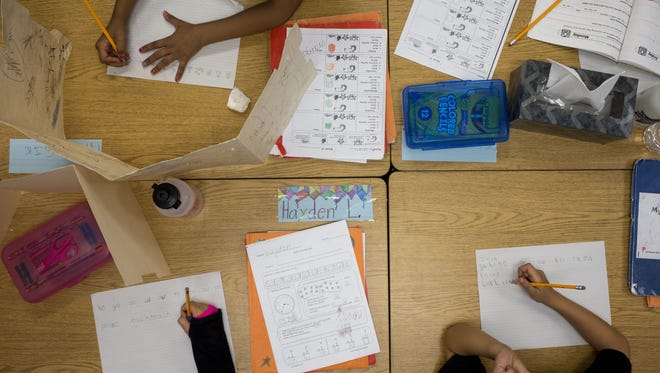Legislation sponsored by state Sen. Christine Marsh, D-Phoenix, would repeal an education funding model that rewards schools who are delivering academic improvement in the state.
A budget proposal by Gov. Katie Hobbs would end the program and redirect the funds to the K-12 base-level fund, resulting in a funding loss for many public district and public charter schools.
Results-based funding is a program started in 2016 by then Gov. Doug Ducey which incentivizes academic performance by allocating funds to schools which saw significant improvement in state assessments. The program currently costs the state $68.6 million annually, a small fraction of the $9 billion which Gov. Hobbs has proposed for K-12 education.
Last Wednesday, the Arizona State Senate Committee on Education discussed the proposed legislation, hearing arguments from both sides. Sen. Marsh spoke in support of the bill, arguing that the current system of results-based funding increases inequities in the state’s education system.
“Everybody knows that high test scores are often very closely correlated with the surrounding community’s socioeconomic status,” Marsh said, adding that she would want an amendment that would “take that money and invest it in areas where we know there are significant positive outcomes for kids.”
However, some education leaders objected that repealing results-based funding would remove the very mechanism by which the state government can assess those positive outcomes, a key strategy in tacking the state’s significant learning loss.
During COVID-19, Arizona had greater learning loss than the nation, and the economic impacts on affected youth and the state are large unless action is taken quickly.
The Hoover Institute reports learning loss for the State of Arizona results in a total economic loss of 2.2 percent of GDP over the 21st Century, or $252 billion.
Supporters of Results Based Funding stated that rewarding those successfully tackling learning loss with everything at stake is good public policy to continue to prioritize.
“One of the things that is exciting since this program was enacted in 2016 is that we are seeing pockets of excellence, we are seeing schools growing significantly with their students, especially in rural Arizona,” said Emily Anne Gullickson, president of Great Leaders, Strong Schools. “We want to be learning and studying from these folks who have figured out how to increase and improve all of our students for preparedness after school.”
Sen. Sine Kerr, R-Buckeye, also expressed concerns that the bill would deprive funding for schools that are not in traditionally affluent areas.
“In my district I have some rural areas I serve in Western Maricopa County and Yuma County, and there are eight schools that I know of that do receive results-based funding and collectively this would be about a $3 million hit to them,” she said.
The results-based program in its current model prioritizes funding for underserved communities, allocating $400 per student to high-achieving schools in lower-income areas, while allocating $225 per student to high-achieving schools in middle-income or high-income areas.
Gullickson also highlighted the academic gains in low-income areas of Southern Arizona.
“Santa Cruz County has received national recognition for being the top 3 county in America for academic growth with students,” she said. “Why would we want to penalize kids and teachers in Rio Rico and Nogales by eliminating their results-based funding for proving what is possible with every child, especially English language learners and kids living in significant poverty?”
The Senate Committee on Education did not vote on the bill Wednesday and only considered it for discussion. However, Committee Chair Sen. Ken Bennett, R-Prescott, stressed the importance of the issue, noting that it is a key priority for Governor Hobbs this legislative session.
















Add comment